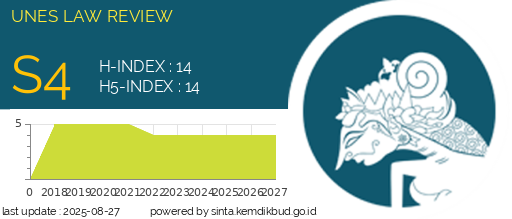Reinventing the Criminalization of Commercial Sex Workers and Prostitution Service Users in Indonesia in the Perspective of Indonesian Criminal Law Reform
DOI:
https://doi.org/10.31933/unesrev.v6i4.1982Keywords:
Online; Criminalization; Commercial Sex Workers; Criminal LawAbstract
The advent of technology and easier internet access has led to a surge in internet and social media users in Indonesia, with apps like MiChat facilitating social interactions that could heighten the risk of HIV spread due to online prostitution. Commercial sex workers, once predominantly victims of trafficking, are increasingly promoting their services independently without intermediaries. This study aims to examine the enforcement of laws against online prostitution practices. The research method employed is normative juridical with a conceptual approach and statutory approach. The study finds that legal analysis of the criminalization of commercial sex work in Indonesia highlights the need for legislative renewal that emphasizes social justice and avoids disproportionate social consequences due to excessive criminalization. The necessary criminal law reform should harmonize sanctions with efforts for prevention, rehabilitation, and social reintegration to create a legal framework that supports individual well-being while maintaining social and moral integrity
Downloads
References
Alin, F. (2017). Sistem Pidana Dan Pemidanaan di Dalam Pembaharuan Hukum Pidana Indonesia. JCH (Jurnal Cendekia Hukum), 3(1), 14. https://doi.org/10.33760/JCH.V3I1.6
Arief, B. N. (1992a). Teori-teori dan Kebijakan Pidana: Masalah Pemidanaan Sehubungan dengan Perkembangan Delik-delik Khusus dalam Masyarakat Modern. Alumni.
Arief, B. N. (1992b). Teori-teori dan Kebijakan Pidana: Masalah Pemidanaan Sehubungan dengan Perkembangan Delik-delik Khusus dalam Masyarakat Modern. Alumni.
Arief, B. N. (2001). Masalah penegakan hukum dan kebijakan penanggulangan kejahatan. Citra Aditya Bakt.
Arief, B. N. (2017a). Bunga Rampai Kebijakan Hukum Pidana: Perkembangan Penyusunan Konsep KUHP Baru. Kencana.
Arief, B. N. (2017b). Bunga Rampai Kebijakan Hukum Pidana: Perkembangan Penyusunan Konsep KUHP Baru. Kencana.
Baihaqi, D., & Rabathy, Q. (2023). Penggunaan Aplikasi Michat Sebagai Sarana Prostitusi Online Di Kota Bandung. KOMVERSAL, 5, 203–215. https://doi.org/10.38204/komversal.v5i2.1444
Blackburn, A. G., Taylor, R. W., & Davis, J. E. (2010). Understanding the Complexities of Human Trafficking and Child Sexual Exploitation: The Case of Southeast Asia. Women & Criminal Justice, 20(1–2), 105–126. https://doi.org/10.1080/08974451003641099
Blakey, J. M., & Gunn, A. (2018). The “ickiness factor”: Stigma as a barrier to exiting prostitution. Journal of Offender Rehabilitation, 57(8), 538–561. https://doi.org/10.1080/10509674.2018.1549177
Cimino, A. N. (2019). Uncovering Intentions to Exit Prostitution: Findings from a Qualitative Study. Victims & Offenders, 14(5), 606–624. https://doi.org/10.1080/15564886.2019.1628144
Darmodiharjo, D. & Shidarta. (1995). Pokok-Pokok Filsafat Hukukum, Apa dan Bagaimana Filsafat Hukum Indonesia. P.T. Gramedia Pustaka Utama.
Dolinsek, S., & Hearne, S. (2022). Introduction: Prostitution in twentieth century Europe. European Review of History: Revue européenne d’histoire, 29(2), 121–144. https://doi.org/10.1080/13507486.2022.2029361
Farley, M. (2003). Prostitution and the Invisibility of Harm. Women & Therapy, 26(3–4), 247–280. https://doi.org/10.1300/J015v26n03_06
Farley, M. (2022a). Making the connections: Resource extraction, prostitution, poverty, climate change, and human rights. The International Journal of Human Rights, 26(6), 1032–1055. https://doi.org/10.1080/13642987.2021.1997999
Farley, M. (2022b). Making the connections: Resource extraction, prostitution, poverty, climate change, and human rights. The International Journal of Human Rights, 26(6), 1032–1055. https://doi.org/10.1080/13642987.2021.1997999
Frondizi, A., & Porcher, S. (2021). The economics of street-level prostitution in Paris during the ‘Belle Epoque’ (1870-1914). Applied Economics, 53(10), 1163–1177. https://doi.org/10.1080/00036846.2020.1827135
Haya, N. (2017). Orientasi Masa Depan Pada Remaja yang Bekerja Sebagai Pekerja Seks Komersial (PSK). Psikoborneo: Jurnal Ilmiah Psikologi, 5(1).
Hornor, G., Quinones, S. G., Bretl, D., Courtney, A. B., Herendeen, P. A., Lewin, L., Loyke, J. A., Morris, K., Schapiro, N. A., & Williams, S. (2019). Commercial Sexual Exploitation of Children: An Update for the Forensic Nurse. Journal of Forensic Nursing, 15(2), 93–102. https://doi.org/10.1097/JFN.0000000000000243
Human Rights Watch. (2016, Mei). Digital Disruption of Human Rights. https://www.hrw.org/news/2016/03/25/digital-disruption-human-rights
Ikawati, L. (2022). Prostitusi Perspektif Hukum Positif dan Hukum Islam. Transformasi Hukum, 1(1), 13–22.
International Labour Organization, Walk Free Foundation, & International Organization for Migration. (2017). Global estimates of modern slavery: Forced labour and forced marriage. International Labour Office (ILO).
Jailani, M. (2020). Tinjauan Socio Legal Kebijakan Pencegahan dan Penanganan Kekerasan Seksual (PPKS) di Perguruan Tinggi Keagamaan Islam (PTKI) – SK Dirjend Pendis Kemenag RI–Draft Peraturan Rektor Tentang PPKS. Journal of Gender and Social Inclusion in Muslim Societies, 1, 119. https://doi.org/10.30829/jgsims.v1i2.8724
Kemp, S. (2021). DIGITAL 2021: INDONESIA. Hootsuite.
Kemp, S. (2022). Digital 2022: Indonesia. Kepios. https://datareportal.com/reports/digital-2022-indonesia
Kemp, S. (2023). Digital 2023: Indonesia. Kepios. https://datareportal.com/reports/digital-2023-indonesia
Kürtüncü, M., Ayyıldız, T. K., & Kurt, A. (2021). An examination of smartphone addiction and loneliness among high school students according to various variables: A sample from Turkey. Perspectives in Psychiatric Care, 57(2).
McCann, A. (2014). Walter Benjamin’s sex work: Prostitution and the state of exception. Textual Practice, 28(1), 99–120. https://doi.org/10.1080/0950236X.2013.835745
Melander, G., Alfredsson, G., & Leif, H. (2004). Kompilasi Instrumen Hak Asasi Manusia Raoul Wallenberg Institute. Pustaka HAM.
Moeljatno. (2008). Asas-Asas Hukum Pidana (Edisi Revisi). Rineka Cipta.
Nurdin, E. (2023). Realita Pekerja Seks Komersial. Scolae: Journal of Pedagogy, 6(1), 7–11.
Pais, M. S. (2010). The protection of children from sexual exploitation Optional Protocol to the Convention on the Rights of the Child on the Sale of Children, Child Prostitution and Child Pornography. The International Journal of Children’s Rights, 18(4), 551–566. https://doi.org/10.1163/157181810X536815
Salman, G. (2022a). Prostitusi di Rusunawa Surabaya, Tersangka Ajari Korban Download Aplikasi Kencan untuk Cari Pelanggan. KOMPAS.com. https://surabaya.kompas.com/read/2022/02/03/114700978/prostitusi-di-rusunawa-surabaya-tersangka-ajari-korban-download-aplikasi?page=all#page2
Salman, G. (2022b). Prostitusi di Rusunawa Surabaya, Tersangka Ajari Korban Download Aplikasi Kencan untuk Cari Pelanggan. KOMPAS.com. https://surabaya.kompas.com/read/2022/02/03/114700978/prostitusi-di-rusunawa-surabaya-tersangka-ajari-korban-download-aplikasi?page=all#page2
Sapardjaja, K. E. (2016). Perkembangan Asas Legalitas. Dalam Demi Keadilan: Antologi Hukum Pidana dan Sistem Peradilan Pidana Enam Dasawarsa Harkristuti Harkrisnowo (hlm. 32–45). Pustaka Kemang.
Seals, M. (2015). Worker rights and health protection for prostitutes: A comparison of The Netherlands, Germany, and Nevada. Health Care for Women International, 36(7), 784–796. https://doi.org/10.1080/07399332.2013.850085
Sirait, A. M. (2008). Eksploitasi Seksual Komersial Mengintai Anak Kita. Jurnal Legislasi Indonesia, 5(3).
Sumera, M. (2013). Perbuatan Kekerasan/Pelecehan Seksual Terhadap Perempuan. Jurnal Lex et Societatis, 1(2), 39–49.
Suryani, L. S., & Purwanti, A. (2018). Kriminalisasi Perempuan Pekerja Seks Komersial dalam Perluasan Pasal Zina RUU KUHP. Sawwa: Jurnal Studi Gender, 13(2), 281.
Unicef. (2020). Protecting the most vulnerable children from the impact of coronavirus: An agenda for action. www.unicef.org. https://www.unicef.org/coronavirus/agenda-for-action.
Ward, E. (2010). Prostitution and the Irish State: From Prohibitionism to a Globalised Sex Trade. Irish Political Studies, 25(1), 47–65. https://doi.org/10.1080/07907180903431988



















